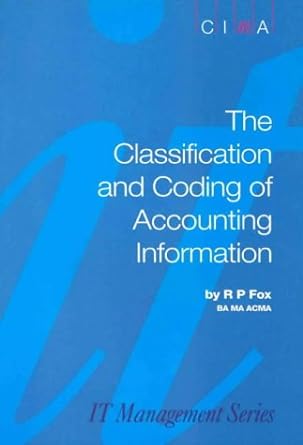Question
QUESTION 3 1) Retrospective application of an accounting policy means: a) Application of accounting policies as if that policy had always been applied. b) Application
QUESTION 3
1)
Retrospective application of an accounting policy means:
a) Application of accounting policies as if that policy had always been applied.
b) Application of accounting policies from the year in which change in accounting
policies happened.
c) Application of accounting policies from the immediately preceding year in which
the change in accounting policies happened.
d) Application of accounting policies without giving effect to the future.
e) Application of accounting policies without giving effect to the prior period items. 2)
When is prospective application of a change in accounting policy allowed?
a) Never
b) When management approve
c) When its impracticable to calculate the cumulative effect of the change
d) None of these
3)
When a change in accounting policy is applied retrospectively then the change shall
be
a) noted in the income statement of the current reporting period
b) adjusted in equity
c) c noted in the income statement of the previous reporting period
d) disclosed in the notes to the financial statements without making adjustments in the
financial statements
4)
Which of the following is not an example of an accounting estimate?
a) Bad debts
b) Inventory obsolescence
c) Warranty obligations
d) Fair value of a financial asset
e) Purchase price of a fixed asset
5)
A change to the useful life of an asset is a change in accounting policy.
a) True
b) False
6)
Which of the following is a change in accounting estimate?
a) Misinterpretation of facts
b) Provision for obsolescence
c) Change in inventory valuation method from weighted average to FIFO
d) Oversights 7)
Which of the following is not a valid reason to change an accounting policy?
a) Change in statute
b) Change in accounting standard
c) Board of directors approve change
d) Management decide it would result in better financial statements
8)
The specific principles, bases, conventions, rules and practices applied by an entity in
preparing and presenting financial statements are called
a) Accounting policies
b) Accounting estimates
c) Accounting principles
d) GAAP
9)
An increase in bad debt provisions is a change in accounting estimate.
a) True
b) False
10)
If a revaluation policy is adopted for tangible, non-current assets for the first time, this
is a change in accounting policy.
a) True
b) False
11)
A change in accounting policy should be disclosed in subsequent financial statements.
a) True
b) False
Step by Step Solution
There are 3 Steps involved in it
Step: 1

Get Instant Access to Expert-Tailored Solutions
See step-by-step solutions with expert insights and AI powered tools for academic success
Step: 2

Step: 3

Ace Your Homework with AI
Get the answers you need in no time with our AI-driven, step-by-step assistance
Get Started


